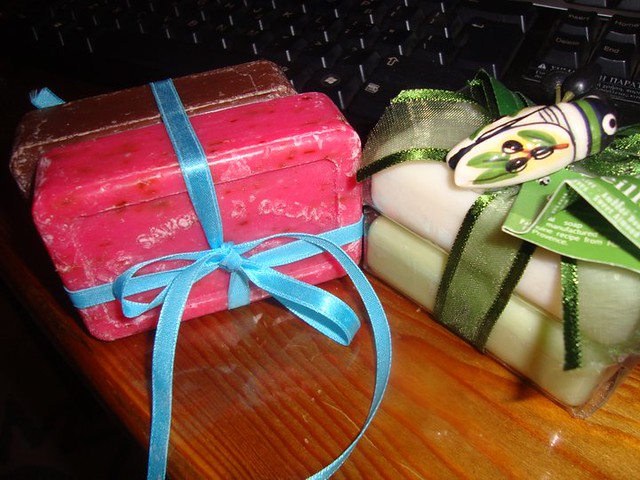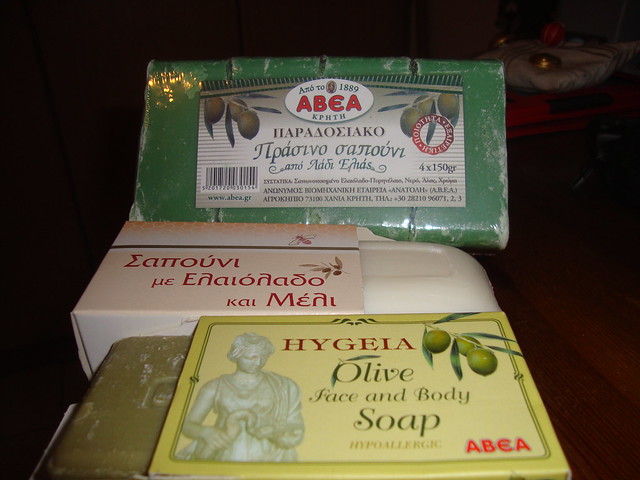In order to succeed, you may have to be prepared to play dirty, even if your line of business is soap, as
this story about the
Omo, Surf and
Tide soap giants tells us. They formed a cartel for detergent prices in eight European countries,
including Greece, who too often and too easily falls victim to toys-for-profit schemes. If it weren't for the 'righteous' act of another soap giant (
Persil spilled the beans to the EU Commission), Greece might still have been paying for this joke.
Maybe it's Greece's fault too: in the past, Greeks too easily fell prey to the 'stigma' of brand names. Greeks (like Americans) are generally fashion victims, preferring brands, not just in clothing and car models, but even when presented with a choice between a brand label and an own label at the supermarket, for mundane everyday items like pasta and soap. This is now definitely changing (
spurred on by the economic crisis), but Greeks still haven't reached the lengths that Germany and Britain go, to economise on supermarket shopping: "The large numbers of Mercedes and BMWs parked in Aldi and Lidl [
both are low-price discount supermarkets] parking lots reinforce the old adage that poor people need low prices, while rich people love low prices." (
Private Label Strategy: How to Meet the Store Brand Challenge
by Nirmalya Kumar and Jan-Benedict Steenkamp, 2007).
Artisinal soap from Marseilles - a present from a friend. The rough-looking brightly coloured soap was quite an eye-catcher: Yes, it was packaged seductively, yes, it looked and smelled beautiful - but it was not as mild or as pure as odorless uncorrupted olive oil soap (you could tell from the feel on your skin).
Greece's soap woes have turned her modern history into a soap opera. How befitting for a country that was once a pioneer in natural soap production - and olive oil soap products continue to take pride of place in the natural soap market, despite the country's reputation.
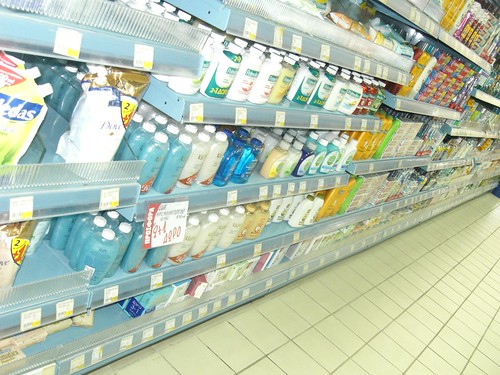
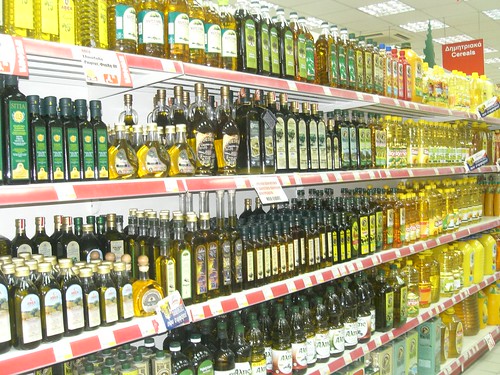
The early days of
soap making and olive oil production go hand in hand, together with the beginnings of Crete's trading industry. In the 1600s, Crete became cultivated intensively with olive fields - before that, mainly wheat was cultivated. In the 1700s, olive oil was exported from Crete for making soap, much more so than for eating! One kilo of olive oil yielded one-and-a-half kilos of soap, making it an extremely profitable business. The French were mainly interested in it, given their renowned soap making skills deriving in Marseilles. Soap was also very important in the textile industry - cotton, and wool had to be cleaned before being spun/used. Crete began to export this value-added (ie more processed) product to France, as it was considered easier to export in this form rather than as olive oil.
(Left: Cretan supermarket shelf showing various olive oil packaging; Right: body soaps on a supermarket shelf in Crete - the olive oil soaps are at the very bottom, in cake form,)
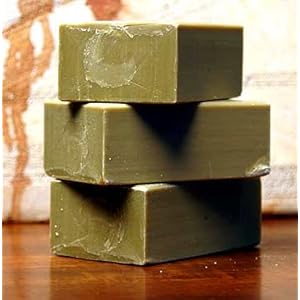
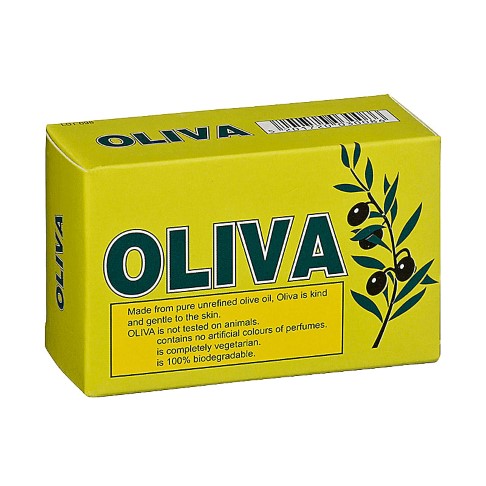
Saponification involves the following steps: liquidising, washing, baking, moulding, stabilising, cutting and packaging. The soap-making skills of the Cretans weren't as high as the French: soap making requires the use of soda ash (carbon nitrate) which had to be of good quality. In the past, Cretans bought it from North Africa/Middle East while the French used Sicilan/Spanish soapstone. So the French would buy Cretan soap and melt it down again and rebake it. The French were in fact Crete's main clients in this sector (60%). Soap making was what controled the prices of olive oil in Crete: it acted as a kind of stock exchange.
(Left: olive oil soap made in Greece, sold by Amazon.com; Right: OLIVA olive oil soap from ABEA, Hania - one of the most popular soaps selling on the web-based market).
Crete wasn't able to compete globally once the industrial revolution was well established in the late nineteenth century, because she was still under Ottoman rule, there was no carbon for fuel and the nature of the island was not business-minded. Cretan agriculture needed to be altered towards industrialisation. The marketable units in existence were just too small in scale: they consisted mainly of olive oil (and oil-derived products like soap), while wine making was also important. Electrification of the island took place in the 1930s. When Crete joined the Greek state in 1913, it was a positive step towards becoming more competitive - but it was still a little too late, considering the point that the West had already reached.
Quality soap production rested on the high knowledge of the skills of the soap-maker even as recently as 50 years ago. Up until the early twientieth century, the island of Lesvos (now known as Mitilini) was the most important soap making area of Greece, while Crete was the second most important. Constantinople was one of the biggest buyers of Cretan olive oil soap, which explains why Lesvos was a more important soap-producing area than Crete; Mitilini was closer to the buyer, so the island was converted into an area of olive monoculture. After the 1922 population exchange between Greece and Turkey, the port area of Pireas became the most important soap-producing area in the country.
Olive oil soap is the best soap to use for personal hygiene (especially women's hygiene); it's not the best for your scalp though, as it leaves residue that creates dandruff. It's also very good at removing olive oil stains from clothing; oil needs oil to get rid of it.
Hania's soap production began with the establishment of the soap-making factory
ABEA, west of the town of Hania, in an area now known as Nea Hora (the "New Country" - it was the first suburb to be built outside the city boundaries) by a French scientist (Julius Deis) in 1889. It only came into Greek hands in 1916. In 1941, the Nazis destroyed the factory completely; it was eventually rebuilt in the same place. Olive oil soap until then consisted of not-very-appealing green or brown cakes of soap. It wasn't until 1960 that aromatic soap began to be produced. In 1971 detergent for clothes washing machines began to manufactured.
By the late 1990s, it was agreed that, due to the urban sprawl, the ABEA soap-making plant had to move out of the town. The smell, dust and smoke were creating havoc in the lives of the people who lived in the area. It wasn't until 1992 that the factory moved out of the town; by 2004, all the plant's operations were moved outside the town to various locations, and in 2004, the original installations were deemed unsuitable for preservation. A
school has now been built on the former site, where only the chimneys of the former factory remain.
All the information about Greek soap making and the ABEA factory comes form the book
"The History of the ABEA Factory in Hania, Crete 1889-2009" (in Greek) by Vasiliki Vourdoumba, Yiannis Vourdoumbas and Andreas Georgousakis, Kasimatis 2011.
©All Rights Reserved/Organically cooked. No part of this blog may be reproduced and/or copied by any means without prior consent from Maria Verivaki.
 Doing business these days is getting increasingly difficult due to competition from large companies that kill off their smaller competitors. Multi-nationals have moved in for good, and they can't be smashed. Small businesses are on the ruin, and they can't be saved. To survive in the business world today, you need to be selling a product or service that is unique and cheap, as well as sustainable. You've got to come up with an idea that no one else has thought of, and
the idea needs to be worked over in great detail both in theory and in
practice, so that the end result is a high quality product that people
will prefer over cheaper alternatives.
Doing business these days is getting increasingly difficult due to competition from large companies that kill off their smaller competitors. Multi-nationals have moved in for good, and they can't be smashed. Small businesses are on the ruin, and they can't be saved. To survive in the business world today, you need to be selling a product or service that is unique and cheap, as well as sustainable. You've got to come up with an idea that no one else has thought of, and
the idea needs to be worked over in great detail both in theory and in
practice, so that the end result is a high quality product that people
will prefer over cheaper alternatives. 





I've been involved in village activities all my life, even though I have lived in a variety of places like Germany, Alexandroupolis, and Samothraki, before coming to Crete, which I now feel is my home. Before I got involved in the soap business, I used to work in various places: restaurants, olive farms, olive processing units, the tourist trade, you name it. Before we even put it into our minds to open the business, we used to make the same soap we sell here in our own home. Eventually we began to experiment with herbs and essential oils for their properties and natural scents and different soap textures for different skin types. Gradually we realised we could be making these products on a larger scale. But we also knew that none of us could actually afford not to continue to work in other paid employment while we are building up the business. We have been open for about 18 months till now. And although we work many hours, every single day of the year, and we've had hardly any time off since we decided to open the shop, we enjoy what we do, and my tiredness is relieved from being involved in what I really like doing.

 We use the standard Haniotiko olive oil soap in our home, so we are quite familiar with this natural product. But FISIKA's olive oil soaps have that added dimension which is lacking from ABEA's products: they are made using purely organic olive oil, they are scented with organically produced substances, and they are all hand-crafted and designed in such a way that you are attracted to the product. My children also got the chance to watch part of the process involved in making soap, while I reminded them that this is what their grandmother used to do too, and this is what their father used for many years, which was made using their own olive oil supplies from the village fields. I wonder if yiayia is up to making soap one more time, to pass on the trade to me...
We use the standard Haniotiko olive oil soap in our home, so we are quite familiar with this natural product. But FISIKA's olive oil soaps have that added dimension which is lacking from ABEA's products: they are made using purely organic olive oil, they are scented with organically produced substances, and they are all hand-crafted and designed in such a way that you are attracted to the product. My children also got the chance to watch part of the process involved in making soap, while I reminded them that this is what their grandmother used to do too, and this is what their father used for many years, which was made using their own olive oil supplies from the village fields. I wonder if yiayia is up to making soap one more time, to pass on the trade to me... 


